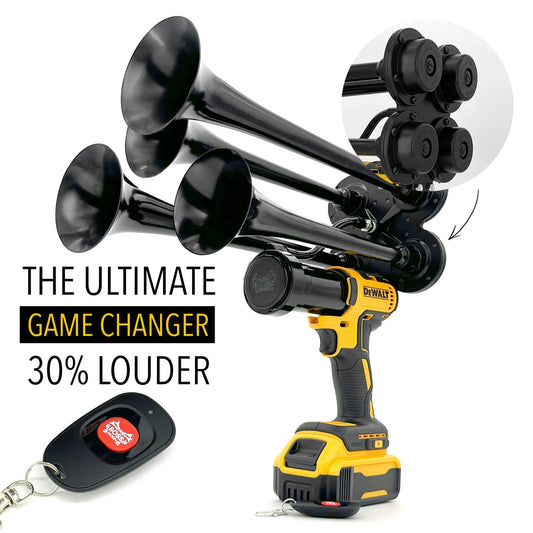Did you know that drivers in California are required by law to use their vehicle horns? The use of car horns in California is regulated to ensure safety on the roads. Horns are an essential component of cars, providing a means of alerting other drivers and pedestrians to potential dangers. While car horns are often associated with frustration or impatience, their primary purpose is to prevent accidents and communicate effectively on the road.
California has a history of implementing car horn regulations to maintain order and reduce accidents. The state's current horn laws reflect the need for drivers to use their horns responsibly and judiciously. Excessive or unnecessary honking can contribute to noise pollution and create unnecessary panic on the roads. Therefore, it is vital for drivers to understand the proper use of their car horns and abide by the regulations.
One engaging element associated with car horn use is a compelling statistic regarding accidents. Studies have shown that a significant number of accidents could have been prevented if drivers had effectively used their vehicle horns. In situations where visibility is limited, honking the horn can alert other drivers to potential dangers and help avoid collisions. Incorporating this statistic into driver education programs can increase awareness and emphasize the importance of responsible horn usage.
To ensure that drivers in California are familiar with the proper use of car horns, it is essential to promote education and awareness. This can involve incorporating horn regulations into driver's license tests, updating the driver's handbook with clear guidelines, and conducting public awareness campaigns. Encouraging respectful and responsible use of car horns can contribute to overall road safety and reduce accidents.
In conclusion, the use of car horns in California is regulated to prioritize road safety. While the image of an angry driver honking in frustration may come to mind, it is crucial to recognize that car horns are primarily intended for communication and accident prevention. By promoting education and awareness about the proper use of car horns, drivers can contribute to safer roads for everyone.
Car Horn Laws in California: What You Need to Know
When it comes to using car horns, understanding the laws in your state is crucial. In California, specific regulations govern the use of car horns to ensure safety on the roads. These rules outline when and how drivers can use their horns while driving. This article will provide a comprehensive overview of car horn laws in California, explaining the permissible uses and potential penalties for misuse. Stay informed to ensure you stay within the boundaries of the law. Continue reading to learn more about car horn regulations in California and how they affect your daily driving.
Noise Restrictions
California has specific regulations regarding the use of car horns to prevent unnecessary noise pollution. These laws aim to maintain peace and avoid disturbances caused by excessive honking.
According to California Vehicle Code (CVC) Section 27001, "No person shall sound the horn of a vehicle upon a highway, except when reasonably necessary to ensure safe operation." This means that honking should only be used in situations where it is necessary to avoid accidents or notify others about potential harm.
Additionally, CVC Section 27007 states that every vehicle must be equipped with a working horn. The horn should meet the requirements specified by the California Department of Motor Vehicles (DMV) and produce a sound that is loud enough to be heard from a reasonable distance.
Quiet Zones
Some areas in California are designated as "quiet zones" where noise restrictions are even more stringent. These zones aim to reduce noise levels in specific areas, such as near schools, hospitals, or residential areas.
In quiet zones, honking is generally prohibited unless there is an emergency situation. Violating the noise restrictions in these areas can result in significant fines and penalties.
Exceptions
While there are strict regulations on honking in California, there are some exceptions where honking may be allowed.
- Honking is permitted to prevent a collision or to warn others of potential dangers.
- It is acceptable to sound the horn to alert pedestrians who may be unaware of an approaching vehicle.
- Some emergency vehicles, such as police cars, ambulances, or fire trucks, are exempt from noise restrictions when engaged in official duties.
Penalties
Violating California's car horn laws can result in fines and other consequences. The penalties for excessive or unnecessary honking may vary depending on the specific circumstances and local regulations.
For example, a violation of CVC Section 27001 can lead to an infraction, with fines ranging from $25 to $250. The exact amount of the fine may be determined by the court based on the severity and frequency of the offense.
It is important to remember that continuous violation of car horn laws or disturbing the peace may result in more serious consequences, such as the suspension of driving privileges or even criminal charges in extreme cases.
Statistics
According to recent data from the California Highway Patrol, there were approximately 5,000 citations issued for car horn-related violations in the state last year. This indicates the importance of adhering to the car horn laws and using the horn responsibly to avoid unnecessary disturbances and potential legal consequences.
https://youtube.com/watch?v=6RFRRRJxLmk
1. "What are the regulations regarding the use of vehicle audible warning devices?"
The regulations regarding the use of vehicle audible warning devices pertain to the circumstances in which they can be used and the restrictions on excessive or unnecessary use. These regulations aim to ensure public safety and reduce noise pollution.
Important information:
- Audible warning devices, commonly known as car horns, are allowed to be used in California but must be used only when reasonably necessary to ensure the safe operation of a vehicle.
- It is prohibited to use a car horn for any purpose other than to ensure safety, such as to express anger or irritation at other drivers.
- Continuous or unnecessarily prolonged use of a car horn is also considered a violation of the law and can lead to penalties.
2. "Under what circumstances is it appropriate to use a car horn?"
Using a car horn is deemed appropriate in specific circumstances where it is necessary to warn others of potential danger and ensure the safe operation of a vehicle. Understanding the appropriate circumstances for using a car horn helps maintain traffic safety and prevent unnecessary noise disturbance.
Important information:
- Using a car horn is generally acceptable to provide a warning that helps prevent accidents or injuries, such as when approaching or passing a vehicle that may pose a danger.
- When in a traffic situation where it is essential to alert other drivers, such as when a vehicle unexpectedly changes lanes without signaling or when passing a blind curve.
- In emergency situations, using a car horn to attract attention and warn others of an imminent collision or potential hazard is crucial.
3. "What are the penalties for violating the regulations regarding car horn usage?"
Violating the regulations regarding car horn usage in California can result in penalties and legal consequences. Understanding the potential penalties helps promote compliance with the law and encourages responsible use of car horns.
Important information:
- Violating the regulations may result in a traffic citation, which can lead to fines depending on the severity of the offense.
- If a car horn is used unnecessarily or excessively, it may be considered a violation of noise ordinances, which can result in additional penalties.
- Continuously violating car horn regulations may also accumulate points on a driver's record, potentially leading to license suspension or increased insurance premiums.
4. "Are there any exceptions to the regulations on car horn usage?"
While the regulations on car horn usage in California apply to most situations, there are a few exceptions where the use of car horns may be allowed even if it is not directly related to safety concerns. These exceptions are limited and should be used sparingly.
Important information:
- Emergency vehicles, such as police cars, ambulances, and fire trucks, are allowed to use their audible warning devices, including sirens and horns, in the performance of their duties.
- Certain authorized vehicles, such as vehicles providing road maintenance services or public utility vehicles, may use audible warning devices when necessary for their operations.
- It is important to note that even in these exceptions, the use of audible warning devices should still be used responsibly and with caution.
5. "What are alternative methods of communication or expressing a warning while driving?"
While car horns are commonly used to communicate warnings while driving, there are alternative methods of communication that can be equally effective, especially in situations where car horn usage may not be appropriate or necessary. Familiarizing oneself with these alternatives helps promote safer and more considerate driving practices.
Important information:
- Hand signals, such as waving or pointing, can be used to communicate warnings or intentions to other drivers when it is safe to do so.
- Flashing headlights, especially during the day or in well-lit areas, can draw attention and signal warnings or the need for caution to other drivers.
- Utilizing hazards or emergency lights can be effective in indicating potential hazards or alerting others to a vehicle that may be stopped or experiencing difficulties.
In conclusion, knowing and adhering to the regulations regarding car horn usage in California is essential for responsible driving. Car horns should be used judiciously, only when necessary to ensure safety on the road. Violating these regulations can result in penalties and legal consequences, underscoring the importance of using car horns responsibly and considering alternative methods of communication when appropriate.
Conclusion
In conclusion, understanding car horn laws in California is crucial for every driver in the state. By adhering to these regulations, drivers can ensure their safety and that of others on the road. Here are the key points to remember about car horn laws in California:
1. Car horns should only be used to warn other drivers or pedestrians of potential danger.
2. Unnecessary honking can result in fines and penalties.
3. Excessive or prolonged honking is considered a disturbance of the peace and is subject to legal action.
4. Emergency vehicles have the right to use their sirens and horns when responding to emergencies.
5. It is essential to be aware of local noise ordinances that may have additional restrictions on car horn usage.
By familiarizing themselves with these regulations and exercising caution, drivers can help create a safer and more peaceful driving environment for everyone in California. Remember, a car horn should be used as a safety feature and not as a means of expressing frustration or annoyance on the road.














